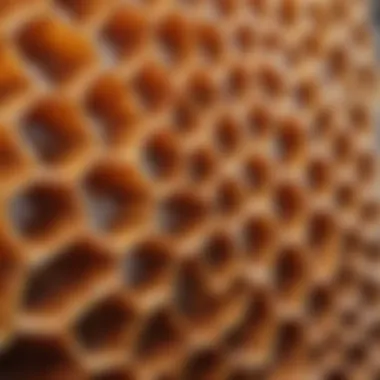Discover the Transformative Benefits of Honey for Skin


Intro
Honey has been cherished since ancient times, not just for its sweetness but for its myriad benefits to skin health. This natural substance, used by various cultures for millennia, is more than just a flavorful addition to tea or a baking ingredient. Its potential in skincare embodies a blend of tradition and science that deserves close examination. This article aims to provide an in-depth look at honey’s remarkable properties and how it can enhance beauty routines today.
The composition of honey includes vitamins, antioxidants, and enzymes that contribute to its effects. These constituents make honey a powerful ally in the quest for healthier skin. Furthermore, honey's humectant properties draw moisture into the skin, offering a hydration solution suitable for various skin types. The historical application of honey in skincare serves as testament to its endurance through ages.
The intention here is to equip readers with not only the knowledge of honey’s benefits but also practical guidance on integrating honey into everyday skincare practices. Consequently, we will explore effective tips, expert advice, and common formulations involving honey, ensuring that beauty enthusiasts, makeup lovers, and skincare aficionados can approach their routines grounded in knowledge and insight.
Preamble to Honey in Skincare
Honey has long captured the attention of those interested in skincare, offering a range of benefits that are both scientifically supported and culturally esteemed. The notion of utilizing honey for skin enhancement is not merely a trend but a practice rooted in history. Understanding this context is essential for appreciating honey's role in modern beauty routines. The properties of honey provide effective solutions for various skin concerns, often making it a favored ingredient in many products.
The significance of honey in skincare extends beyond its natural allure. Its antibacterial, moisturizing, and antioxidant properties contribute to effective skin health. This article will explore how honey acts as a multifunctional ingredient, addressing not only topical skin ailments but also integrating into overall skincare rituals seamlessly.
Historical Context of Honey as a Skincare Ingredient
The use of honey dates back to ancient civilizations, where it was valued for both culinary and medicinal purposes. Egyptians, for instance, employed honey in beauty treatments, recognizing its ability to promote a radiant complexion. Texts from ancient Greece highlight honey's role in beauty, mentioning its applications in various skincare regimens. Over time, this traditional knowledge has been passed down through generations, solidifying honey’s place as a staple in beauty rituals.
In Eastern cultures, honey has been utilized in Ayurvedic practices for centuries, praised for its natural healing properties. These historical usages have laid the foundation for contemporary skincare techniques that prioritize natural ingredients. Today's beauty enthusiasts continue to seek out honey for its gentleness and effectiveness, evidencing its lasting legacy.
Cultural Significance of Honey in Beauty Rituals
Honey remains ingrained in beauty practices across cultures. In Japan, women have used honey as part of their skincare routines, valuing its soothing and hydrating capabilities. Folk tales in various cultures consistently uphold honey as a symbol of beauty and nourishment.
Particularly in skincare, honey's versatility allows it to be combined with a multitude of other natural ingredients, resulting in a myriad of treatments. Rituals involving honey often highlight not just its effectiveness but also its representation of care and craftsmanship. Moreover, the ritualistic act of applying honey connects individuals to a historical continuum of beauty practices.
Overall, the synthesis of historical context and cultural significance reveals that honey is more than a simple skincare ingredient; it is a testament to centuries of beauty exploration and innovation. Exploring honey in skincare gives us insights into both its practical efficacy and its enduring appeal.
Natural Properties of Honey
Honey is often praised not only for its delectable taste but also for its remarkable properties that benefit skin health. Recognizing these natural properties is crucial as they form the foundation of why honey has been utilized in skincare for centuries. This section aims to highlight the antibacterial, moisturizing, and antioxidant characteristics of honey. Each property contributes significantly to its efficacy and supports its role in modern beauty practices.
Antibacterial Properties
Honey's antibacterial properties are attributed to its unique composition, which includes high sugar content and low water activity. These factors create an environment less conducive to the growth of bacteria. Research has shown that honey can effectively inhibit the growth of various pathogens, including Staphylococcus aureus, a common skin contaminant. This makes honey particularly beneficial for those prone to acne or other skin infections. Additionally, the presence of hydrogen peroxide, which is produced when honey is diluted, further enhances its antibacterial effect. Using honey as a topical treatment not only helps in reducing inflammation but also aids in the healing process, leaving the skin clearer and healthier.
Moisturizing Benefits
The moisturizing benefits of honey are well-documented in skincare literature. Honey acts as a humectant, meaning it attracts moisture to the skin. This property makes it an ideal ingredient for dry or dehydrated skin types, as it can help maintain hydration levels. When applied, honey forms a barrier that locks in moisture, thus promoting a plump and supple skin texture. Furthermore, its natural viscosity allows it to gently coat the skin, enhancing overall texture. Those looking to achieve a radiant complexion will find that incorporating honey into their routines can lead to noticeable improvements in skin hydration.
Antioxidant Characteristics
Honey is rich in antioxidants, including flavonoids and phenolic acids. These compounds play a crucial role in protecting skin cells from oxidative stress caused by free radicals. Exposure to environmental factors such as pollution and UV radiation leads to premature aging, but honey’s antioxidant properties can mitigate these effects. Regular use can help maintain the skin’s youthful appearance by reducing the appearance of fine lines, wrinkles, and age spots. The inclusion of honey in skincare formulations not only supports skin health but also acts as a preventive measure against signs of aging.
"Honey's natural properties make it a versatile ingredient in skincare, appealing to those who value both efficacy and tradition in beauty practices."
In summary, the natural properties of honey significantly contribute to its status as a revered skincare ingredient. Its antibacterial, moisturizing, and antioxidant traits provide a multifaceted approach to maintaining healthy skin. Understanding these characteristics enables beauty enthusiasts and skincare aficionados to make informed decisions on integrating honey into their routines.
Scientific Evidence of Honey’s Efficacy


The examination of honey's effectiveness for skin care can be substantiated through scientific research. Understanding the empirical evidence is crucial for validating the claims made about honey’s benefits. This section outlines relevant studies and expert insights that reveal the multifaceted roles honey plays in skin health.
Clinical Studies Supporting Honey’s Benefits
Multiple clinical studies have explored honey's positive effects on skin conditions. For instance, a study published in the Journal of Cosmetic Dermatology investigated the impact of honey on acne-prone skin. The findings revealed that individuals who applied honey topically experienced a noticeable reduction in acne lesions. This is attributed to honey's antibacterial properties, which help fight the bacteria causing acne.
In another study, researchers focused on the use of honey in wound healing. The American Journal of Clinical Dermatology detailed how honey accelerated the healing process in patients with chronic wounds. Participants who used honey dressings showed significant improvement compared to those treated with conventional methods. The antimicrobial capabilities of honey, alongside its ability to maintain moisture, contribute to this enhanced healing.
Expert Opinions and Reviews
Expert opinions further reinforce the scientific evidence regarding honey’s benefits. Renowned dermatologists frequently cite honey's versatility in skincare. For example, Dr. Marko Jovanovic, a dermatologist based in New York, highlights that honey can act as a natural moisturizer and humectant, drawing moisture to the skin. His reviews indicate that honey’s application can lead to improved hydration levels, making it a valuable addition to various skincare products.
Moreover, the International Journal of Dermatology features a series of reviews emphasizing honey’s beneficial properties. Experts agree that its use can alleviate symptoms associated with eczema and psoriasis. They note how honey's anti-inflammatory effects reduce redness and irritation, which are commonly experienced in these conditions.
The consensus among dermatological experts is clear: honey is not only safe for most skin types, but it also offers numerous therapeutic benefits. Its historical significance and array of applications provide confidence in its potential as a staple ingredient in skincare routines.
How to Incorporate Honey into Your Skincare Routine
Incorporating honey into your skincare routine can yield significant benefits for your skin. Honey's natural properties make it an ideal ingredient for various applications. Both users and experts agree that the sweet substance can enhance skin texture, hydrate the surface, and deliver multiple nutrients to the skin layers. Furthermore, knowing how to use honey properly is essential to maximizing its benefits while minimizing any potential drawbacks.
Using Honey in Face Masks
Face masks are one of the most effective ways to utilize honey in skincare. Creating a honey face mask is simple. Just combine honey with other ingredients tailored to your skin type. For instance, if you have dry skin, you may mix honey with avocado or yogurt for a moisturizing effect. People with oily skin can combine honey with lemon or clay to absorb excess oil.
- Choose Your Base: Common ingredients include yogurt, avocado, or oatmeal.
- Mix With Honey: Blend the selected ingredient with raw or Manuka honey until smooth.
- Apply: Spread an even layer on your face and leave it on for 15-20 minutes before rinsing.
- Frequency: Use the mask 1-2 times a week for optimal results.
Honey acts as a humectant, attracting moisture to the skin. This allows for hydration, giving the face a healthy glow.
"Face masks with honey can rejuvenate your skin, making it appear softer and more radiant."
Honey as a Natural Cleanser
Honey is not only great for masks but can also be an effective natural cleanser. Many commercial cleansers strip skin of essential oils, leading to dryness. In contrast, honey cleanses without harming the skin’s natural barrier. To use honey as a cleanser, consider the following steps:
- Wet Your Face: Start with damp skin for improved absorption.
- Apply Honey: Use a small amount of honey (about a teaspoon) and massage it gently on your face.
- Rinse Thoroughly: After massaging for a few minutes, rinse with warm water.
This method is best for sensitive skin as honey soothes irritation while combating bacteria. When used regularly, honey can help clear pores and reduce breakouts.
Adding Honey to Moisturizers
Integrating honey into your daily moisturizer can enhance its hydrating properties. Many store-bought moisturizers contain honey extracts, but you can easily add honey to your existing product. Here is how:
- Select a Moisturizer: Choose a moisturizer that suits your skin type.
- Mix with Honey: Adding a few drops of honey to your palm or a small amount to the moisturizer in the jar can provide extra nourishment.
- Apply as Usual: Mix the moisturizer and honey together before applying it to your face and neck.
This not only helps in increasing moisture but also allows for additional benefits like soothing inflammation and reducing redness.
In summary, incorporating honey into your skincare routine involves a few straightforward steps. Using it in masks, as a cleanser, or in conjunction with moisturizers can provide a range of benefits. Beyond promoting hydration and reducing blemishes, regular use of honey can lead to a healthier complexion overall.
Common Honey Formulations for Skin Care
In the realm of skincare, honey holds a distinguished place due to its unique and varied formulations. Understanding these formulations allows consumers to select products that best align with their skin needs. When applied correctly, honey acts as a potent ally in achieving healthy, radiant skin. Analyzing the different types of honey used in skincare helps to appreciate their distinct benefits and applications.


Raw Honey vs. Processed Honey
Raw honey retains more of its natural nutrients, enzymes, and antioxidants compared to processed honey. During processing, honey often undergoes filtration and heating, which can diminish its beneficial properties. Thus, raw honey is often preferred in skincare. It can provide superior moistening and skin-healing capabilities. Additionally, raw honey's antibacterial elements can help combat acne, while its high viscosity is perfect for face masks, ensuring prolonged contact with the skin.
Conversely, processed honey may still offer some benefits, but it may not be as effective in terms of skincare. It can be more convenient to use due to its uniform texture and longer shelf life. However, for those serious about skincare, raw honey is generally the better choice.
Manuka Honey: A Unique Option
Manuka honey stands out in the honey family due to its distinct properties. Sourced primarily from the nectar of the Manuka tree in New Zealand, it possesses high levels of methylglyoxal. This compound is known for its strong antibacterial qualities. Studies indicate that Manuka honey can effectively treat wounds and reduce inflammation. Its potential for soothing irritated skin makes it an excellent choice for those dealing with skin issues such as eczema or psoriasis.
Moreover, Manuka honey can help enhance hydration levels deep within the skin. It works well in formulations such as serums and cleansers, providing added benefits without being overly greasy or heavy. However, the cost of Manuka honey is often higher than regular honey, which may be a consideration for those looking to include it in their skincare routine.
Honey Blends with Other Natural Ingredients
Combining honey with other natural ingredients can amplify its skincare benefits. Many formulations now incorporate honey with oils and extracts that complement its properties. For example, honey combined with coconut oil creates a moisturizing treatment that soothes dry skin. This blend utilizes the emollient properties of coconut oil alongside honey's humectant qualities.
Another popular combination is honey with aloe vera. This blend provides a cooling, soothing effect, making it ideal for sensitive or sunburnt skin. The antibacterial nature of honey works harmoniously with the healing properties of aloe, promoting faster recovery.
"Blending honey with natural oils can allow for enhanced skincare performance, making formulations more robust and effective."
Choosing blends that feature honey can be particularly beneficial for creating custom skincare routines. The flexibility of honey allows it to adapt to various skin types, enhancing both the effectiveness and the sensory experience of skincare products.
Potential Risks and Considerations
When discussing honey’s benefits for skin, it is crucial to also consider potential risks and relevant factors. Despite honey’s long history of safe usage, some individuals may experience adverse reactions. Understanding these risks enables users to maximize the benefits while minimizing potential negative effects.
Allergies and Skin Reactions
Honey can induce allergic reactions in certain individuals. This is particularly true for those who have sensitivities to bee products. Symptoms might include redness, itching, and swelling at the application site. It is important to perform a patch test before applying honey on a larger area of skin. A simple method involves applying a small amount of honey to the forearm and waiting 24 hours.
"Always test on a small area first to evaluate any skin reactions or allergies."
If no adverse reaction occurs, honey is likely safe for use. However, if any irritation develops, it is advisable to cease use immediately. Furthermore, people with allergies to pollen may also experience reactions, as honey can contain traces of pollen. It is prudent to consult a healthcare provider if there are pre-existing allergies.
Choosing Quality Honey for Skincare
Selecting the right type of honey is significant for skincare. Not all honey is created equal. Raw honey is usually recommended because it retains more beneficial properties compared to processed honey. Processed honey can undergo heat processing, which may diminish its natural benefits.
Here are key points to consider when choosing honey:
- Look for Raw Honey: This type is unprocessed and retains its natural enzymes and nutrients.
- Verify Source: Choose honey from trusted and reputable suppliers. Local sources can often provide information on their harvesting methods.
- Check for Purity: Avoid honey that contains additives or high fructose corn syrup, as these can negate the beneficial properties.
In summary, while honey can offer various skincare benefits, caution should be exercised to avoid allergies and ensure high-quality selection. This approach helps preserve skin health while leveraging the positive attributes of honey.
Comparative Analysis: Honey and Other Natural Ingredients
The comparative analysis of honey against other natural ingredients is crucial in the discussion of skincare. This section helps to clarify the unique benefits honey offers when placed alongside well-known alternatives like aloe vera, coconut oil, and olive oil. Understanding these distinctions can aid beauty enthusiasts, makeup lovers, and skincare aficionados in making informed choices about their skincare routines. Unlike many other natural products, honey provides a blend of antibacterial properties, effective moisturization, and strong antioxidant characteristics.
Honey vs. Aloe Vera


Honey and aloe vera are both hailed for their skincare benefits yet they serve different roles. Aloe vera primarily offers soothing and healing properties, making it an excellent choice for calming irritated skin and hydration. It is often used for sunburn relief or post-skin irritation. On the other hand, honey works similarly but adds an extra layer of nourishment.
- Moisturization: Honey acts as a humectant, drawing moisture to the skin. Aloe vera also hydrates, but honey contains nutrients that improve the skin’s texture.
- Antibacterial Effects: While aloe offers minor antibacterial benefits, honey is significantly more effective in combating bacteria due to its natural composition.
- Healing Properties: Both products assist in healing, but honey can help minimize scars and blemishes more effectively.
In essence, honey complements aloe vera’s soothing qualities with a deeper nourishment and a fight against acne-causing bacteria.
Honey vs. Coconut Oil
Comparing honey with coconut oil reveals distinct differences in composition and application. Coconut oil is famous for its ability to moisturize and create a protective barrier on the skin. It is rich in fatty acids that are excellent for dry skin, making it a popular choice for many. However, it can clog pores for some individuals.
- Hydration: Both options provide hydration, but honey hydrates differently by attracting and locking in moisture.
- Texture and Absorption: Honey is lightweight and absorbs quickly, while coconut oil can leave a greasy residue.
- Antimicrobial Properties: Honey stands out with its stronger antibacterial properties, making it better for those prone to breakouts.
Ultimately, while coconut oil excels in providing a protective layer, honey offers additional benefits for clearer and healthier skin.
Honey vs. Olive Oil
Honey and olive oil represent two classic ingredients in natural skincare. Olive oil is often viewed as a deeply nourishing agent, rich in vitamins and essential fatty acids. It provides excellent moisturization and is beneficial for dry skin, much like coconut oil. However, honey's unique properties give it an edge in various aspects.
- Absorption: Honey penetrates the skin readily, while olive oil may take longer to absorb, potentially leading to a heavy feeling.
- Nutrient Delivery: Honey's antioxidants are ideal for fighting free radicals, whereas olive oil, although beneficial, has a different composition that focuses more on hydration.
- Skin Brightening: Honey can illuminate the skin, enhancing natural glow, while olive oil's benefits are more focused on long-term nourishment.
In the realm of natural skincare, honey stands out for its multifaceted advantages, from hydration to significant antimicrobial benefits. Understanding how it compares to other natural ingredients allows for more informed choices in skincare routines.
Future Trends in Honey-Based Skincare
The exploration of honey in skincare goes beyond its traditional uses. The growing awareness of natural ingredients has fueled interest in honey-based products. Beauty enthusiasts are increasingly turning to honey for its unique properties. This section examines emerging trends in honey-based skincare, highlighting innovation and sustainability.
Emerging Products Featuring Honey
The market has seen a rise in innovative products that feature honey as a key ingredient. Brands are recognizing its versatile benefits. Some notable products include:
- Honey-infused serums: These serums enhance hydration and elasticity, catering to those seeking a youthful glow.
- Honey-based cleansers: Designed to cleanse without stripping natural moisture, these products promote gentle and effective cleansing.
- Honey face masks: Many brands are launching pre-made masks that specifically target blemishes, dryness, or aging.
The integration of honey with other natural ingredients, such as essential oils and botanical extracts, is gaining popularity. This combination can create more comprehensive skincare solutions. For those interested in DIY skincare, honey remains a favored base ingredient that pairs well with numerous components, like yogurt or green tea.
Sustainability in Honey Harvesting
Sustainability is a significant consideration in the future of honey-based skincare. The demand for natural products has raised concerns about the impact on bee populations. Sustainable beekeeping practices are essential for ensuring that honey remains available as a skincare ingredient without harming the environment. Some important aspects include:
- Ethical sourcing: Consumers are increasingly seeking brands that prioritize sustainable practices. Ethical beekeeping supports bee health and the ecosystem.
- Local honey production: Supporting local beekeepers can reduce the carbon footprint associated with transporting products. It can also boost local economies.
- Awareness and education: Educating consumers about the importance of bees in agriculture and skincare is critical. Awareness can drive the market towards more sustainable options.
"The future of honey-based skincare lies not only in its benefits but also in the responsible practices that ensure its availability for generations to come."
By focusing on sustainable honey harvesting and innovative products, the skincare industry aims to create a balance between beauty and environmental stewardship. Embracing these trends can lead to a holistic approach to skincare that benefits both the user and the planet.
End
The conclusion serves as a vital point of reflection in this exploration of honey's benefits for skincare. It pulls together the various threads woven throughout the article. Honey is not just a sweet substance; it is a potent ally in skin health and beauty.
Honey's long history as a skincare ingredient underscores its enduring value. From ancient civilizations to modern formulations, honey has consistently been recognized for its ability to nourish and protect the skin. Its antibacterial and moisturizing properties are well-documented, making it a reliable choice for various skin types.
The article emphasizes how to effectively incorporate honey into one’s skincare routine. Simple methods, like using honey in face masks or as a cleanser, make it accessible to everyone.
Moreover, potential risks such as allergies, along with guidance on selecting quality honey, are critical aspects that any skincare enthusiast should consider. Knowledge of these factors helps prevent adverse reactions and optimizes the benefits of using this ingredient.
Adding honey to your skincare regimen can also align with trends towards natural and sustainable beauty products. As consumers increasingly seek out eco-friendly options, honey's role is likely to expand.
In summary, this exploration illustrates that honey is more than just a traditional remedy; it is a versatile ingredient with numerous advantages. Whether you're a beauty enthusiast or a casual user, understanding the value of honey in skincare can lead to more informed and beneficial choices.







